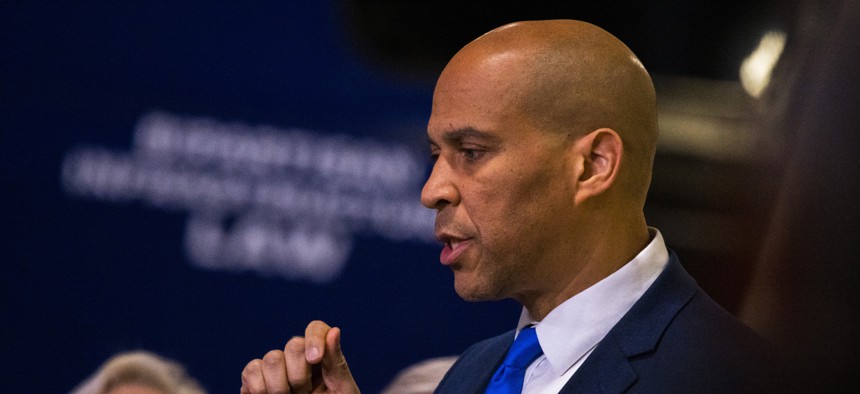Another Democrat joins chorus of concerns about CBP’s mobile app

Sen. Cory Booker (D-N.J.) expressed concerns in a March 27 about possible discrimination issues in the use of the CBP One app. Michael M. Santiago / Getty Images
Sen. Cory Booker (D-N.J.) is the latest to express concerns about CBP's mobile application and its role in the asylum process.
Sen. Cory Booker (D-N.J.) became the latest Democrat on Capitol Hill to articulate concerns about the use of the Customs and Border Protection’s CBP One mobile application at the border in a March 27 letter to the agency and the Department of Homeland Security.
Lawmakers have pushed back about the use of the app, which launched in 2020, for migrants seeking exceptions to the so-called Title 42 pandemic restrictions on immigration put in place in 2020. Those restrictions allow the U.S. to turn away immigrants to prevent a possible contagious spread of disease.
In January, DHS announced that the app would be used for people seeking exceptions to Title 42 by allowing certain individuals to schedule appointments before arriving at land ports of entry.
Non-U.S. citizens can use the app to schedule an appointment if they’re located in Central or Northern Mexico, but according to advocacy group the American Immigration Council — which sued the CBP to get records about the app via the Freedom of Information Act — CBP One is currently used for travel authorization for Cubans, Haitians, Nicaraguans and Venezuelans as well.
CBP states in a fact sheet about the app that its use “streamlines the experience at the port of entry, may reduce wait times and permits a safe and orderly process at POEs for all travelers.”
Since its creation in 2020, the app has been the subject of privacy-related critiques over government data collection, but more recently, media reports have detailed problems with access disparities in terms of the technology, glitchy functionality and limited appointment slots relative to demand.
Booker raised these concerns in his March 27 letter, noting that “Successfully receiving an appointment is akin to winning the lottery for the thousands of migrants living in camps waiting to secure an interview slot. Beyond the odds of getting an appointment, technical issues make it virtually impossible for many migrants to access the app – antiquated devices, poor cell phone service or language access have all become barriers.”
There have also been reports of individuals with darker skin struggling to submit face photographs required for the app, although DHS officials told The Washington Post that they reject the notion that the app doesn’t work as well with people with darker skin.
But beyond technical issues, Booker said in his letter that the app still places access limitations on users seeking appointments through it.
“Even if the CBP One app was as efficient, user friendly, fair and inclusive as possible – which I hope one day it will be – it would still be inherently discriminatory,” he writes. “To use the app, a person must have a working cell phone, a reliable internet connection, and must have adequate resources and be in good enough health to safely stay in a single location either near the southern border or in their country of origin. This situation is not the reality for asylum seekers whose lives are threatened in their home country or in northern Mexico.”
Booker also laid out concerns about who gets appointments, noting that the system, which only offers limited appointment slots, apparently does not consider when someone first registered on the app to try to get an appointment.
The New Jersey senator isn’t the only concerned lawmaker.
Sen. Edward Markey (D-Mass.) sent a letter asking DHS to stop using the app in February, citing privacy concerns around biometrics and location data as well as technical problems and access problems.
And Reps. Joaquin Castro (D-Texas), Chuy García (D-Ill.) and Raúl Grijalva (D-Ariz.) also have written to DHS about the app, along with 32 other House Democrats.
For its part, the administration touted the appointment scheduling process in January and signaled that the app will also be used after Title 42 is no longer in place.
“When Title 42 eventually lifts, noncitizens located in Central and Northern Mexico seeking to enter the United States lawfully through a U.S. port of entry have access to the CBP One mobile application for scheduling an appointment to present themselves for inspection and to initiate a protection claim instead of coming directly to a port of entry to wait,” a January fact sheet reads.
“This new feature will significantly reduce wait times and crowds at U.S. ports of entry and allow for safe, orderly and humane processing,” the sheet continues.
The Biden administration plans to end the public health emergency for the coronavirus in May, and has since signaled in Supreme Court briefings that that ending will also end Title 42.
CBP did not respond to request for comment by publication time.



